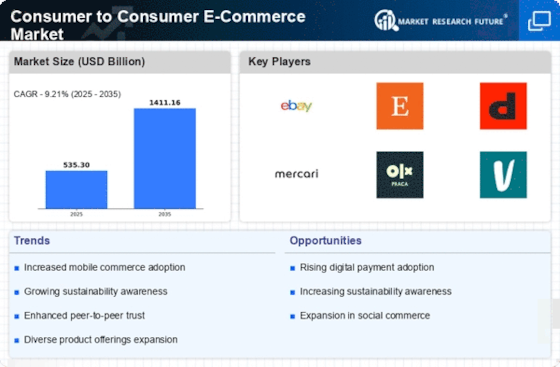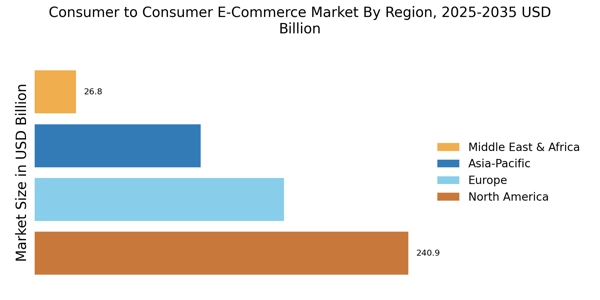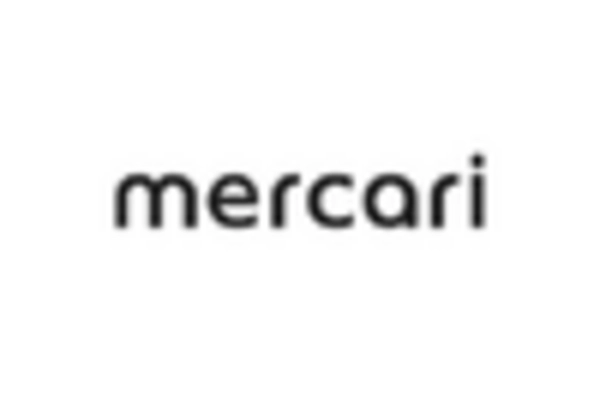Rise of Social Commerce
The Consumer to Consumer E-Commerce Market is witnessing a transformative shift with the rise of social commerce. Social media platforms are increasingly integrating shopping features, allowing users to buy and sell products directly through their feeds. This trend is supported by data indicating that nearly 50% of social media users have made a purchase through a social platform in the past year. The seamless integration of e-commerce functionalities within social networks enhances the shopping experience, making it more interactive and engaging. As users share their purchases and experiences, the Consumer to Consumer E-Commerce Market benefits from organic promotion and word-of-mouth marketing. This dynamic not only fosters community engagement but also encourages users to participate in the marketplace, thereby expanding the reach and impact of C2C transactions.
Increased Internet Penetration
The Consumer to Consumer E-Commerce Market is experiencing a notable surge due to the increasing penetration of the internet across various demographics. As more individuals gain access to the internet, the potential customer base for C2C platforms expands significantly. Recent data indicates that internet usage has reached approximately 60% of the global population, facilitating easier access to online marketplaces. This trend is particularly pronounced in emerging markets, where mobile internet access is becoming ubiquitous. Consequently, the Consumer to Consumer E-Commerce Market is likely to witness a substantial increase in transactions as more users engage in buying and selling activities online. The ease of access to digital platforms enables individuals to connect, trade, and share resources, thereby fostering a vibrant marketplace that thrives on user-generated content and peer-to-peer interactions.
Shift Towards Sustainable Practices
The Consumer to Consumer E-Commerce Market is increasingly shaped by a shift towards sustainable practices among consumers. There is a growing awareness of environmental issues, prompting individuals to seek out eco-friendly products and services. Data suggests that approximately 70% of consumers are willing to pay more for sustainable options, indicating a significant market opportunity for C2C platforms that prioritize sustainability. This trend encourages sellers to offer second-hand goods, handmade items, and other environmentally friendly products, aligning with consumer values. As the demand for sustainable practices continues to rise, the Consumer to Consumer E-Commerce Market is likely to adapt, fostering a marketplace that not only meets consumer needs but also contributes positively to environmental conservation.
Growing Popularity of Online Marketplaces
The Consumer to Consumer E-Commerce Market is significantly influenced by the growing popularity of online marketplaces. Platforms such as eBay, Etsy, and Facebook Marketplace have gained traction, providing users with accessible venues to buy and sell goods. Recent statistics suggest that the number of active users on these platforms has increased by over 20% in the past year alone. This trend indicates a shift in consumer behavior, where individuals prefer the convenience and variety offered by online marketplaces over traditional retail options. As these platforms continue to evolve, they are likely to enhance user experience through improved features and services, further driving engagement. The Consumer to Consumer E-Commerce Market stands to benefit from this trend, as more users are drawn to the ease of listing items and the potential for reaching a broader audience.
Technological Advancements in Payment Solutions
The Consumer to Consumer E-Commerce Market is being propelled by technological advancements in payment solutions. Innovations such as digital wallets, cryptocurrency, and instant payment systems are enhancing the ease and security of transactions between consumers. Recent data indicates that mobile payment transactions have increased by over 30% in the last year, reflecting a growing preference for cashless transactions. These advancements not only streamline the purchasing process but also build trust among users, as secure payment methods reduce the risk of fraud. As technology continues to evolve, the Consumer to Consumer E-Commerce Market is likely to see an increase in transaction volumes, as consumers feel more confident engaging in online buying and selling activities.

















